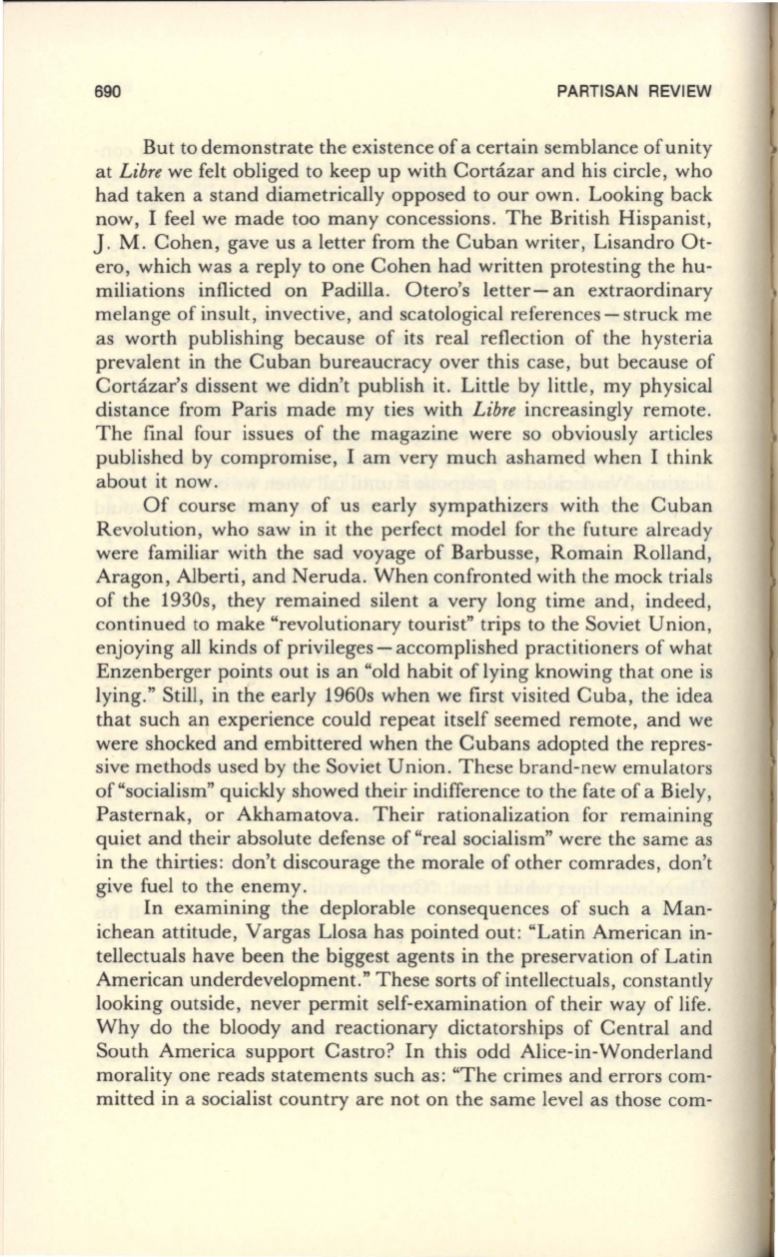
690
PARTISAN REVIEW
But to demonstrate the existence of a certain semblance ofunity
at
Libre
we felt obliged to keep up with Cortazar and his circle, who
had taken a stand diametrically opposed to our own. Looking back
now, I feel we made too many concessions. The British Hispanist,
J.
M. Cohen, gave us a letter from the Cuban writer, Lisandro Ot–
ero, which was a reply to one Cohen had written protesting the hu–
miliations inflicted on Padilla. Otero's letter- an extraordinary
melange of insult, invective, and scatological references- struck me
as worth publishing because of its real reflection of the hysteria
prevalent in the Cuban bureaucracy over this case, but because of
Cortazar's dissent we didn't publish it. Little by little, my physical
distance from Paris made my ties with
Libre
increasingly remote.
The final four issues of the magazine were so obviously articles
published by compromise, I am very much ashamed when I think
about it now.
Of course many of us early sympathizers with the Cuban
Revolution, who saw in it the perfect model for the future already
were familiar with the sad voyage of Barbusse, Romain Rolland,
Aragon, Alberti, and Neruda. When confronted with the mock trials
of the 1930s, they remained silent a very long time and, indeed,
continued to make "revolutionary tourist" trips to the Soviet Union,
enjoying all kinds of privileges- accomplished practitioners of what
Enzenberger points out is an "old habit of lying knowing that one is
lying." Still, in the early 1960s when we first visited Cuba, the idea
that such an experience could repeat itself seemed remote, and we
were shocked and embittered when the Cubans adopted the repres–
sive methods used by the Soviet Union. These brand-new emulators
of "socialism" quickly showed their indifference to the fate of a Biely,
Pasternak, or Akhamatova. Their rationalization for remaining
quiet and their absolute defense of "real socialism" were the same as
in the thirties: don't discourage the morale of other comrades, don't
give fuel to the enemy.
In examining the deplorable consequences of such a Man–
ichean attitude, Vargas Llosa has pointed out: "Latin American in–
tellectuals have been the biggest agents in the preservation of Latin
American underdevelopment." These sorts of intellectuals, constantly
looking outside, never permit self-examination of their way of life.
Why do the bloody and reactionary dictatorships of Central and
South America support Castro? In this odd Alice-in-Wonderland
morality one reads statements such as: "The crimes and errors com–
mitted in a socialist country are not on the same level as those com-


